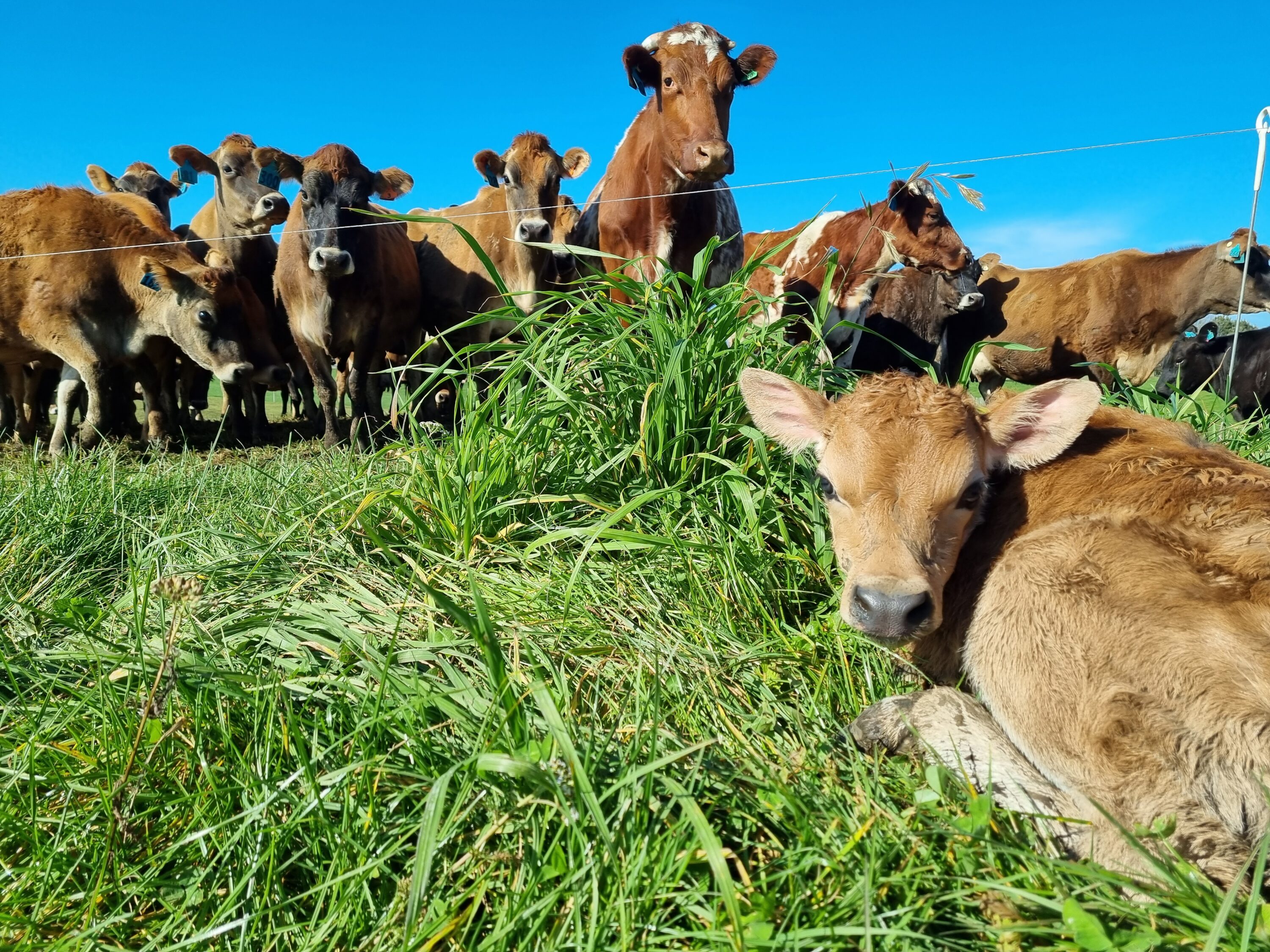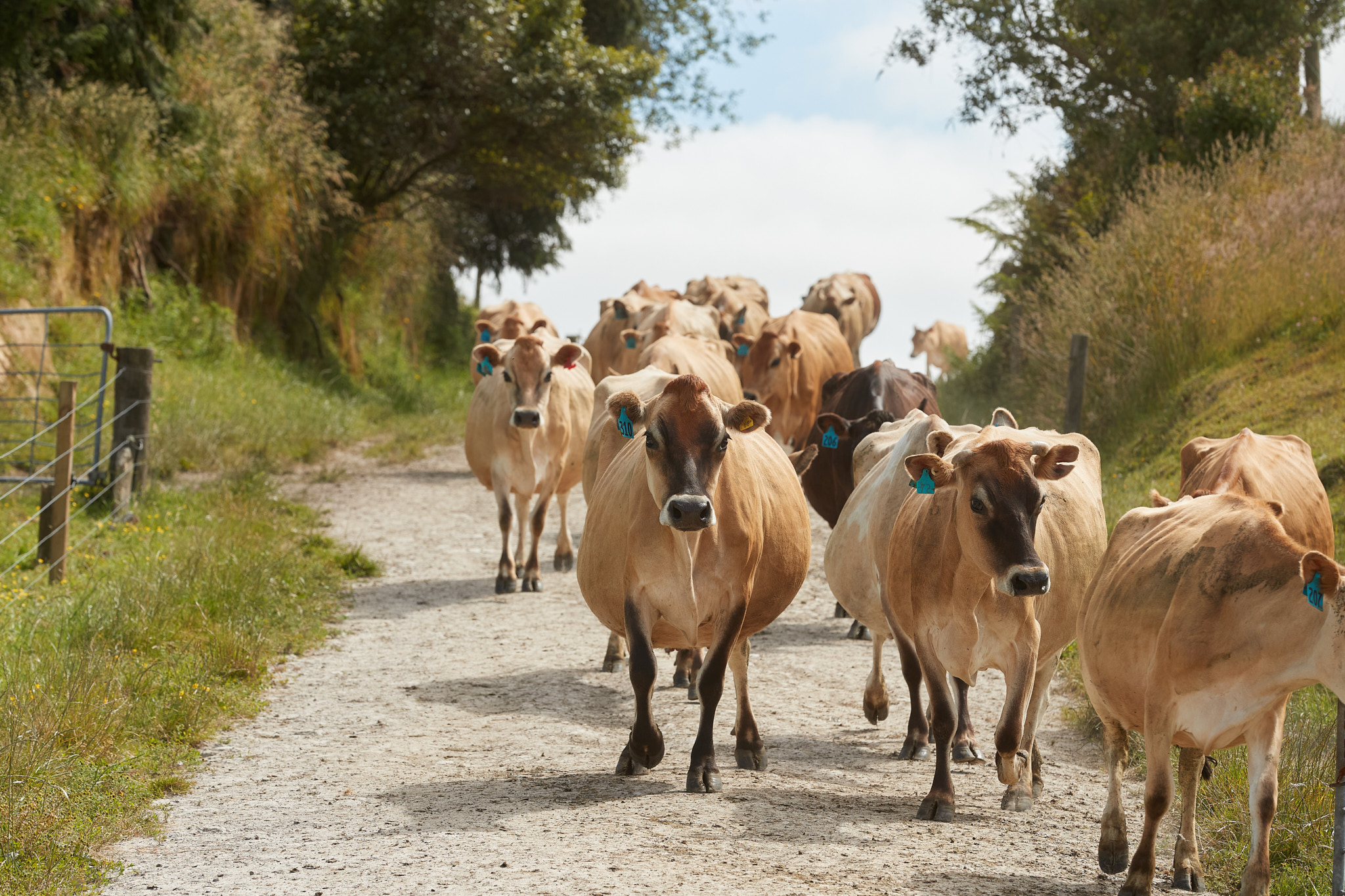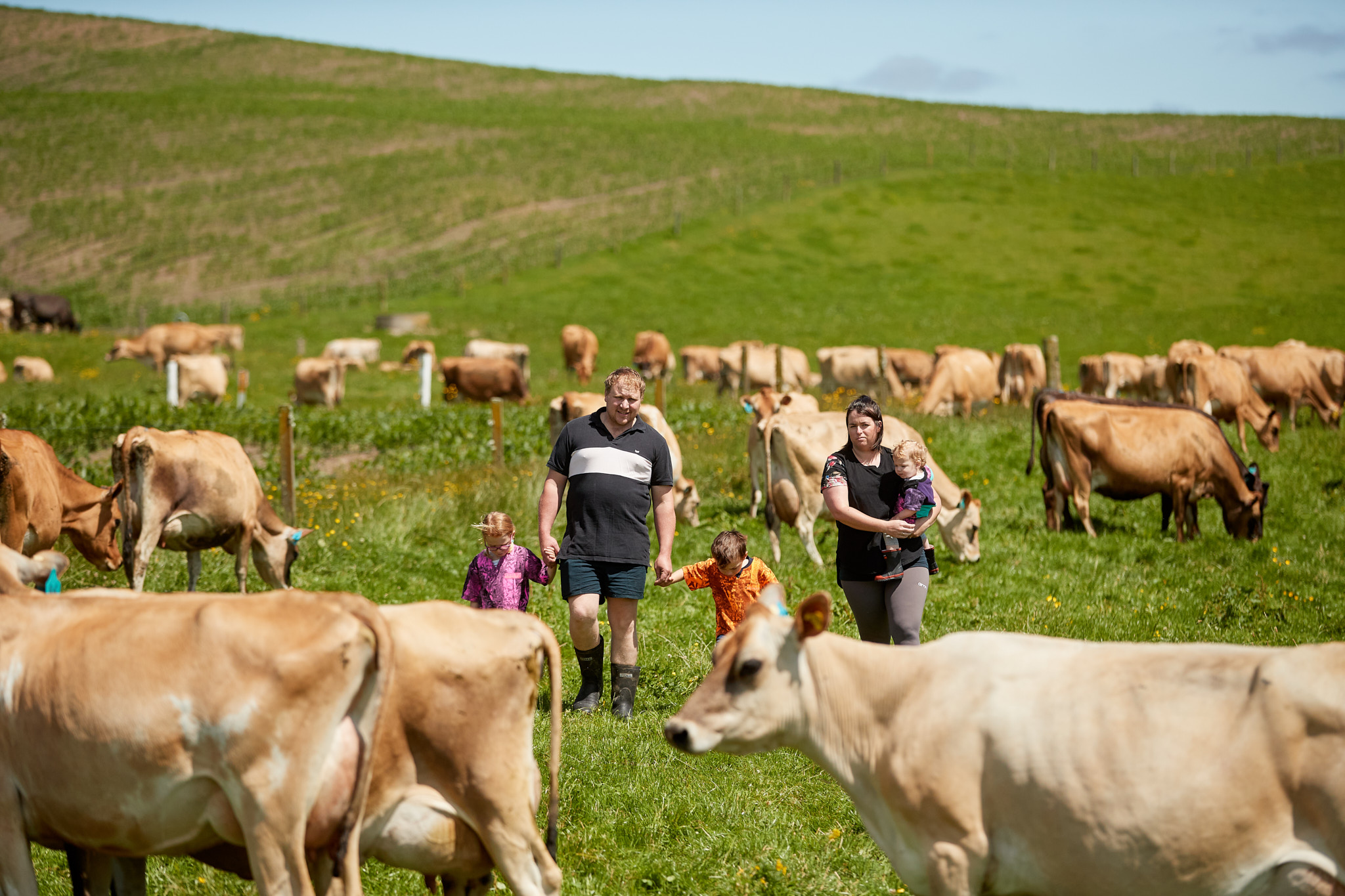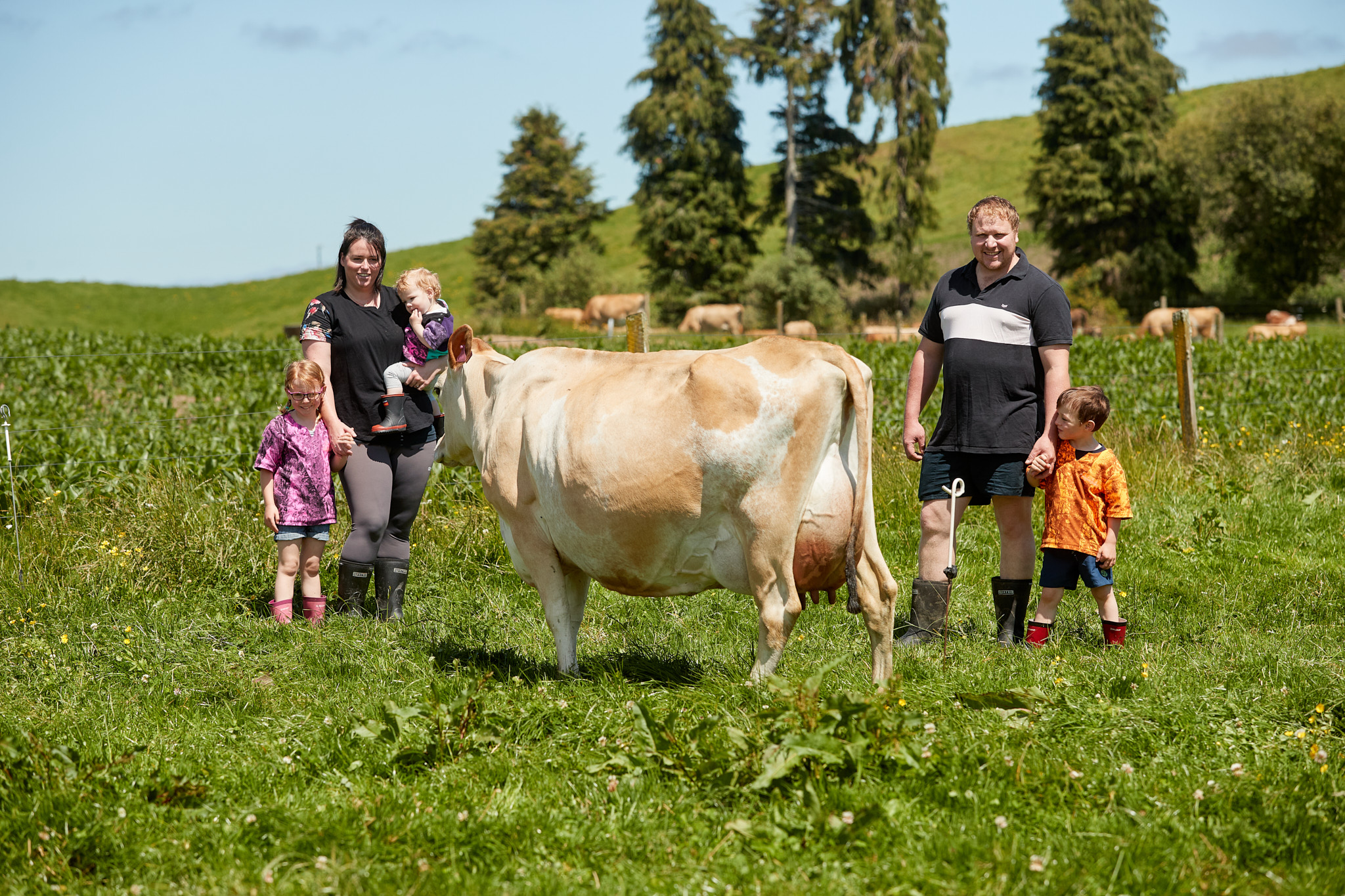Tahau Jerseys
Josh Sneddon hasn’t come far from his family farm to the farm he currently sharemilks alongside wife Kareena. Now farming on the boundary of Tokoroa in the South Waikato, Josh grew up on his parents Tim & Gayle Sneddon’s Tahau Jerseys farm just 3km away, the youngest of seven children. Both farms now share the Tahau prefix.
Having built up their sharemilking business over the past few years, one of the drawcards of returning to the Tokoroa area was that family support. Many Jersey NZ members have followed Josh & Kareena’s progress over the past few years, from the early birth of twins Olivia and Kyle at just over 26
weeks, to the life-changing diagnosis of young daughter Natalie with Cystic Fibrosis.
Kareena also has a farming background in crossbreeds, and brother Shayne Coombe now has pedigree Ayrshires. Kareena trained as a teacher in Hamilton, working part time in the Jersey NZ office to support her studies. She went on to teach at Whakamaru School for four years, then did a year relieving before the twins were born.
Josh & Kareena’s first sharemilking job was for three years south of Tokoroa, where Kevin Ireland was their neighbour. The next three years were spent sharemilking near Otorohanga on a farm with some real physical challenges. The farm had an internal rotary shed, and a road running through it. But to top that – the main trunk rail line also went through the farm.
It would always take a while to acclimatise the cows to the train going through, and if they needed to cross the herd over the tracks they had to phone the controller first to check timings. Then cross fingers that the driver didn’t toot on the way through if the stock were waiting! This was a successful job for them though, and the farm owner replaced their herd
with another Jersey herd in what has been a traditional Holstein Friesian stronghold. Josh is very clear that if it wasn’t for the additional family support that a move back to Tokoroa gave them, they would have been very
happy to stay in that job.
Now at Tokoroa, they are milking 320 cows this season up from 300 last year, which was their first season on this farm. The herd is 94% Jersey, with a few Milking Shorthorns thrown in for something different. These
were purchased from Norm Atkins, and they have come to be known on farm as the ‘short hornycorns’ as Kyle & Olivia call them. Josh had started his own herd at a very young age, and in his early career while working and managing he and Kareena also had cows with both families as well.
Having worked for Richard Thomson for four years, Josh
purchased cows from Golden Brae herd when Richard sold up. The farm is 98 ha and 364 metres above sea level. The area is well-known for being cold in winter, with 40+ frosts most years. They have had a lot of frosts so far
this winter, with 11 in a row at one point. The farm gets good rainfall and is summer safe. If it does dry out, its usually not until late February/early March, which is then followed by the autumn rain. They back onto the
Tokoroa town boundary and there are six lifestyle block neighbours on the main road side.
The cows are milked through a 30 aside herringbone shed with automatic cup removers. The shed is open so provides great flow for the cows, and is set up with drafting gates etc so that the cows can be milked by one person. The farm also employs one full time labour unit, Jack, who is 18 and has been with them a year. Jack has a lot of drive, already undertaking NZ Dairy apprentice courses and Josh believes that he has a great future in the dairy industry. Kareena works as a reliever when Jack is off, and also feeds the calves with Natalie in tow in their trusty farm car with plenty of snacks and her iPad. Having Jack on farm has been a game-changer for the Sneddons as a family, enabling more time off farm.
They started calving on 17 July, and when visited were just at the hallway point. Josh is unhappy with the heifer calf situation, with over 150 cows now milking there are only 23 replacement heifer calves in the shed. At least his favourite cows had all had heifers in the last few days! About 10% of the herd (low production or not full pedigrees) are mated to White Hereford, resulting in a calf that resembles Belgian Blue or Speckle Park. He has a market for those calves, and only the smallest are bobbied. He also has market for all of his Jersey bull calves and has noticed a real shift in the market with buyers even prepared to take Jerseys with some white markings. One Holstein Friesian breeder purchases high BW full recorded Jersey bull calves to use over his heifers.
Josh and Kareena are moving towards using more polled semen, with over 60% of the herd in calf to polled bulls. All Lynns Demos P and Pine-Corn Popcorn PP ET from Semex; Drumclog AG Nightrider PP ET, Arkans Amplify PP ET, VJ Leske P from Samen; and Canaan LA Achiever ET PP, Ardachie Peacemaker PP and Ardachie Dimple PP from CRV. The balance are in calf to high index LIC bulls. When selecting polled bulls, Josh uses both P and PP to ensure variety. He currently has 11 PP cows in the herd, and is actively trying to get more BW in their offspring while trying to breed good PP bulls for the industry. He is getting plenty of polled bulls, and the bull buyers are keen on these too. He is working alongside CRV who are assisting with genomics, but also happy for Josh to follow his own programme. He expects to have at least one bull to nominate for Jersey Future this season. One of the reasons that Milking Shorthorns appealed to Josh is that there are plenty of options in terms of polled sires for them too.
Josh does nine weeks of mating – five weeks of AB followed by four weeks with bulls. If there are lower numbers with AB the bulls will go out earlier, both beef and Jersey. That way he can keep the Jersey calves if they are needed as he can identify the sire.
Last year Josh was asked by CRV to help out with a two-run AB route that quickly spiralled into a 8-farm run. Once again it was having Jack on farm that made that possible. This year he intends to just do his own herd, his fathers’ herd and a good friend’s herd.
The cows are all wintered on farm. Last year was the first time that a Jersey herd had been wintered, and the traditional 100 tonnes of bought-in grass silage will be reconsidered this year as it was not all used. They grow 10 ha of maize on farm. Calves are grazed off farm from 1 December, returning as in-calf heifers. Their grazing is close by near Putaruru, they get great communications from the grazier and are able to use their own bulls over the heifers.
Last season, their first on the Tokoroa farm, they matched the previous production that had come from a Holstein Friesian/crossbred herd at 464 kg MS per cow. The farm owner is very happy with this result, as he had wanted to see something different on the farm. Josh and Kareena’s goal is to produce 480 kg MS with similar inputs, making all supplements on farm. They believe that to go any higher they will need to add some form of concentrate. Traditionally while the farm has milked 280 Holstein-Friesians, their record was produced from 285 Jerseys, which will increase this year. The herd is spring calving, and milks twice a day throughout the season. Josh comments that it is too cold for autumn calving without a feedpad and automatic feeders.
One practice that Josh & Kareena trialed with great success a few years ago was feeding the calves just once a day. Down at Otorohanga, and with no other farm or family support, a season with lots of flooding issues, extra work training the whole herd into a internal rotary shed, and premature newborn twins made them rethink their workload. They key is to work smarter not harder. Josh and Jack only pick up the calves once a day after the morning milking. If they are fresh they will be left for an extra day as long as they have had a feed and are walking around. The colostrum cows are milked once a day after the morning milking, then go to twice a day once they enter the herd. If they are unwell they will stay in the colostrum mob longer. This has had the added benefit of fewer metabolic issues in the cows, and they go on to get in calf easier. The calves are then fed about 11-11.30am daily.
The main benefit is for the family as it means that Kareena can still be there for the children in the mornings and after school/early evening, look after the calves and still be available to help Josh if she is needed.
The first year was a trial – their aim was to still get the calves to weaning weight at the right time. It worked, and they are now in their fifth season. They offer meal at a younger age and in larger quantities than normal, and water and hay are always on offer, building them up to 5 litres over a week and a half. This has worked for both the family and the calves, with a big improvement in calf health and a stress point removed from the day.
Kyle and Olivia (now 5) were born at 26.4 weeks after Kareena spent a couple of weeks in hospital. But those two weeks made a big difference as they were able to be treated with steroids and treatments to help their development before birth which meant that their stay in NICU (Neo-natal intensive care unit) was fairly uneventful. However, very shortly after coming home and as the herd started to calve, they both developed bronchiolitis so it was back to the hospital. It was a really tough time for this young family, but they are both at school now, thriving and settling in really well.
Natalie (almost two) was then diagnosed with Cystic Fibrosis at 10 days old following the standard newborn heel prick test. This turned their lives upside down, by the end of the day they had seen a CF nurse and Natalie had been started on enzymes. A sweat test later that week confirmed the diagnosis and started the cycle of regular hospital visits – first weekly gradually moving to fortnightly, monthly and now three-monthly with home visits and contact from a CF nurse in between. Natalie’s daily treatments fit in around their family life, and both Kareena and Josh are involved – Kareena gets the older two off to school while Josh does Natalie’s morning physiotherapy. Her food intake must be carefully monitored, and enzymes calculated and fed within 20 minutes of food. Either overdosing or underdosing can cause her pain, but fruit and most fat free foods are great snacks. Gloves and sanitizer are in constant use in the house and out on the farm. CF is a progressive disease, so there is always something new to learn & adapt into the family’s routine. Regular use of nebulisers, nasal rinses and percussion physiotherapy all increase if Natalie is unwell, and all the family takes care to ensure that she stays as well as possible. Exercise is really important for Natalie, but she needs to replenish salt when exercising, so she’s actually allowed potato chips and powerade as she gets older!
Extended family have also had training in supporting Natalie, which means that she can be left with them and Josh and Kareena can still get to enjoy time with Olivia and Kyle. As a family this is really important to them, they still have two other children who need to be able to be children, and get special time with their parents. Employing Jack also means that they can get off farm for short breaks as a family.
Earlier this year, Josh and Kareena wanted to help out Cystic Fibrosis NZ who have provided them with a lot of support. After the twins were born they had auctioned three yearlings to support the NICU, and so they decided to do the same for Cystic Fibrosis NZ. They got in touch with Nigel Riddell at Link Livestock Ltd, who arranged for Bidr to waive their fees. Then it went viral, local businesses and farming organisations donated goods, and Cystic Fibrosis NZ also got some of their supporters on board. This auction went on to raise over $20,000. It was such a success that they plan to do it again next year and then every second year and link it in to CF awareness month in May. They have also been promoting the local Waikato CF bull calf drive. Josh comments that they have been very humbled by the support both from their local community, corporate business and the Jersey community who donated animals, semen and goods for auction.
Check out Kareena’s ‘sassy.and.salty’ Facebook page where she highlights Natalie’s ups & downs and promotes CF awareness. She has also been active alongside Cystic Fibrosis NZ in encouraging Pharmac to fund the drug Trikafta, and has met with her local MP who understands the long term benefits of being able to provide this drug. If you have heard the term ‘sixty five roses’, this is a reference to CF developed from kids who could not say Cystic Fibrosis properly and is now used a touchstone for the CF community.
Josh has also taken on a leadership role with Jersey NZ as part of the JerseyGenome selection panel.
This young family have faced some significant challenges, but have adapted their farming lifestyle to allow them to face those challenges head on. Far from just heads down and getting on with it, they are proactive in the farming, Jersey and CF communities in their day to day lives promoting their farm and breeding, and CF awareness.
Written by Pam Goodin




